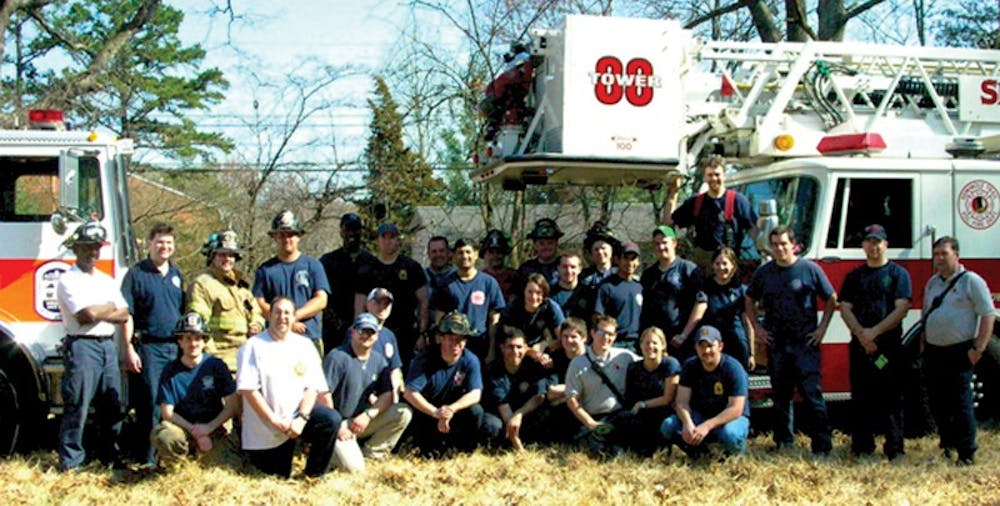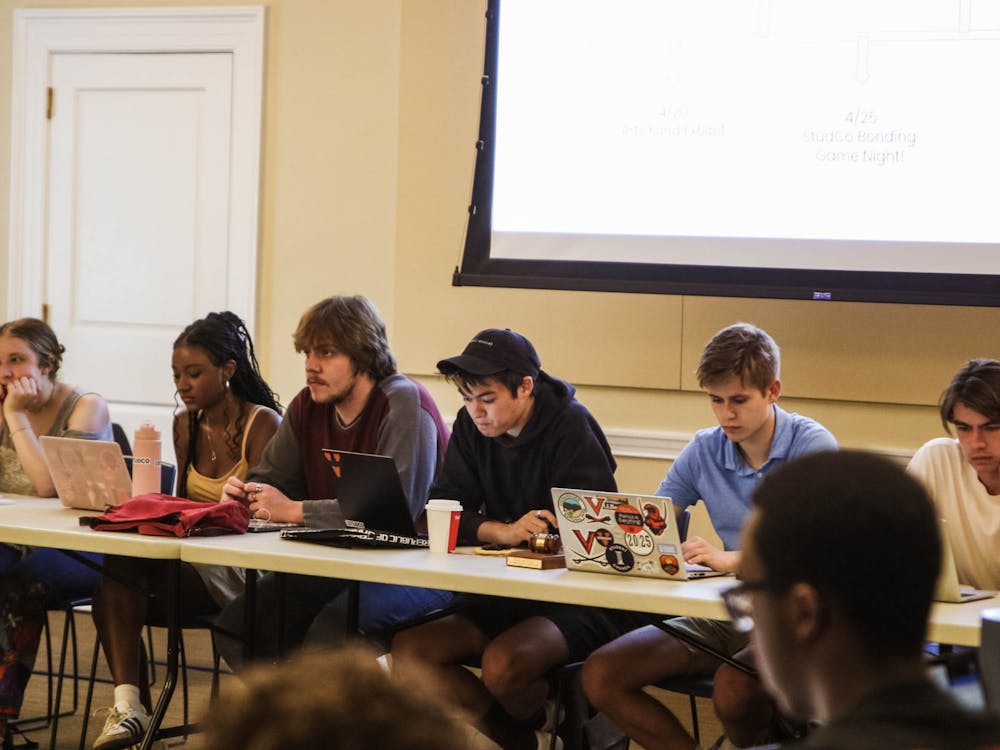As the preliminary hearing for former Virginia lacrosse player George Huguely nears, some worry the prosecution may face a nightmare scenario - they remember Andrew Alston.
On Nov. 7, 2003, Walker Sisk, a volunteer firefighter, spent the evening on the Corner with his friends. By the end of the night he was dead after being stabbed 20 times. Then-third-year College student Andrew Alston was arrested Nov. 8. On June 21, 2006, he walked away from prison a free man.
Certain details of what happened that night are undisputed. At about 2 a.m. Nov. 8, 2003, two groups of friends were walking down opposite sides of 14th Street after leaving Corner bars. Sisk began yelling across the street at a friend of Alston's. Sisk and his friend then crossed the street to where Alston's group stood. A physical fight broke out between Sisk and Alston, and witnesses observed Alston punching Sisk in what they described as an odd way, as though he had keys in his hand. Sisk fell to the ground, bleeding. He had received 20 stab wounds and died later that morning. Alston, who was found to have a wound on his hand consistent with stabbing someone, was arrested and charged with second-degree murder.
Legal proceedings\nA year later, Alston's fate was decided in court. The commonwealth argued Alston had willfully killed Sisk by stabbing him 20 times. It charged him with second-degree murder, which carries a maximum prison sentence of 40 years.
The defense contended Alston had acted in self-defense. "A knife was produced, wound up in Walker's hands, and they struggled over the knife and that's how Walker got stabbed to death," lead defense attorney John Zwerling said, describing the argument in a recent interview.
It was up to the jury to determine whether or not Alston was guilty and of which crime, as well as to make a recommendation about the length of any prison sentence. The jury was able to convict on either second-degree murder, if it believed the prosecution's argument, or voluntary manslaughter, if it believed Alston had killed without malice.
Assistant Commonwealth's Attorney Jon Zug, who served as the lead prosecutor in the case, said he told Sisk's parents Alston probably would receive voluntary manslaughter because Sisk had crossed the street to approach Alston.
"The reason that I felt I had at least a 50-50 shot at getting a second-degree murder is the fact that Andrew Alston stabbed Walker 20 times," he explained. "And to me, that's what demonstrated the malice."
The jury acquitted Alston of second-degree murder, however, and instead returned a verdict of voluntary manslaughter, which carries a maximum sentence of 10 years in prison. The jury recommended three, including the time Alston already had served while awaiting trial.
Zwerling characterized the decision as a light sentence for the crime. "For a person who was defending his life, it was not light," he said. "But for a person who was guilty of voluntary manslaughter of another person, it is light."
Reaching the verdict\nMany were outraged by the result of the trial. "The problem that I've seen through all these things is, it's about the jury," said Howard Sisk, Walker Sisk's father. "How do you stab someone 20 times and not find malice? I personally don't think the jury did their job."
Members of the jury, however, said they undertook the challenging decision-making process carefully.
"It was difficult because you have people of different personalities and ... some of them came in and initially said 'give him the max' and others said, 'well, you know, he's already served some time, but maybe he shouldn't do his life,'" jury foreman Juandiego Wade recalled. "It went across the board as far as what the sentence should be ... Everyone just felt it was sad all the way around, because ... one life was gone; another one was ruined."
Elizabeth Probasco Kutchai, another juror, said she has nothing but respect for her fellow jurors. "I was the only Quaker in the room but I really have to say I was amazed at how Quakerly everyone was," she said, explaining how Quakers approach decision-making by "humbly [seeking] the truth together."
Kutchai added that the frustrating part of serving on a jury is a sense that jurors do not have access to all the information people outside the courtroom do. She recalled times when the jurors were told to go into another room while the judge and the attorney conferred, "so I assume that there is a lot that we weren't allowed to know about, and there's nothing we can do about that," she said.
Zwerling said the jury's sympathy for both sides appears to be responsible for the verdict. "According to some of the accounts from the jurors afterwards, there was a lot of sympathy for both families, the Alstons and the Sisks, but one of the families' sons was dead and the other one wasn't, so they didn't feel they could acquit," he said. "But they did have sympathy and that's why they gave such a light sentence for this particular crime."
Zug said he was unsure if sympathy played a role in the decision, but he vehemently disagreed with Zwerling's characterization of the sentence. "To this day the thing that baffles me beyond all belief is that the jury only gave him a three-year sentence," he said. "To this day, I do not understand what that jury was thinking."
A town and gown issue?\nJurors resisted the idea that their decision was influenced by the fact that the defendant was a University student while the victim was not. "It really didn't [have an effect]," Wade said. "We didn't say, 'Well, they're a student so we have to take this into consideration.'"
Kutchai described the dynamic as something that was highlighted in the media but had no effect on the jurors, who she added were not allowed to read press coverage of the trial. "It all got whipped up into a frenzy because of the whole town-gown aspect, and I saw that only from reading the newspapers that I read after," she said.
She added that the social position of the people involved has an effect on the press coverage. "Certainly if it was just, you know, two low-income local dudes squaring off, it wouldn't have been given any attention in the newspaper," she said.
Zwerling speculated that Alston may have been disadvantaged because Sisk's father was "well-respected" by the local community.
Zug said he could not determine if Alston's status as a student had an effect. "I just flat out don't know," he said. "I will tell you he had the best defense money can buy." He said the prosecution estimates Alston's family spent nearly $250,000 on his defense.
"It was clearly evident that ... his dad bailed him out," said Blake Caravati, a former Charlottesville mayor who served on the City Council at the time of the murder. "[Alston's father] wrote big checks to big lawyers ... it was very upsetting to a lot of people because of the dad. It seemed inequitable."
He described a sense of protection afforded to University students which does not exist for local community members. "It seemed rigged to me," he said. "How could a man stab another 20 times and get away with three years?" He said the only lasting negative consequence for Alston is his felony record. "Big deal," he said. "It's that inequity that the University students very seldom feel. [They]'re protected in a way."
Remembering Walker Sisk\nCharlottesville area residents experienced anger at the outcome of Alston's trial and sadness at Sisk's death, but they also worked to commemorate the young man's life. Following his death, donations began to pour into the Seminole Trail Volunteer Fire Department, where Sisk worked, Department Chief Doug Smythers said.
"We wanted to do something internally in the department to utilize that money in a way that we felt Walker would appreciate," he said, explaining this led to the founding of Walker Sisk Memorial Truck School. Each year students and instructors from around the state come to hone their skills at truck, or ladder, work, a specific kind of rescue work. "Truck work is kind of dirty, and it's not glamorous," he said. "That was the way Walker was. He'd just get down and do the dirty work when it needed to be done." Sisk's parents attend every year, Smythers said, adding that he opens the annual weekend course by talking about who Sisk was.
He described Sisk as an adventurous person who loved the outdoors, explaining he had once taken a leave of absence from the fire department and headed to Alaska without any plans.
"He just kind of lit up a room," Smythers said. "He was always in a good mood, joking with the guys, just always having a good time. From a fire service perspective, he really loved the ability to give to people who were in need."
Smythers said Sisk's death was a loss for the community and the service.
Howard Sisk described the effect of his son's death on him and his wife. "I know what [Yeardley Love's parents] are going through and it's just unbelievable, and I just feel so bad for them," he said. "They'll never be the same."
He also recalled reporters asking him if Alston's trial brought him closure. "You never find closure," he said. "I mean, we lost our only child ... There isn't a day that doesn't go by that I don't think about my son."
-Rodger Nayak contributed to this article.





